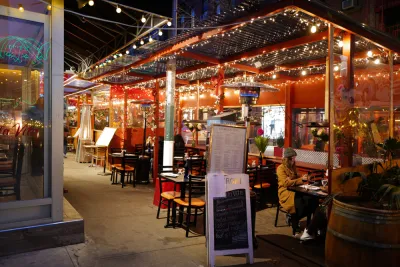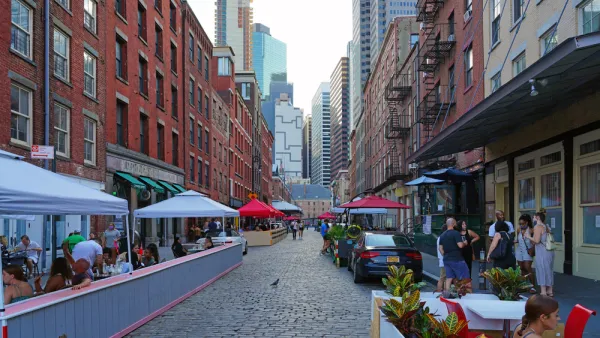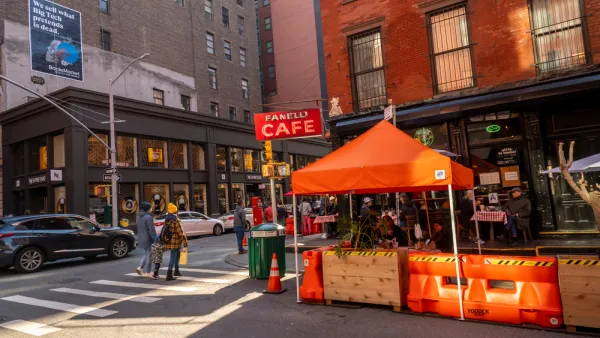A proposal to shift responsibility away from the Department of Transportation has met staunch resistance from industry groups and advocates of the program.

Writing in Streetsblog NYC, Kevin Duggan reports on the uncertain future of New York City’s outdoor dining program, which has been administered by the city’s Department of Transportation (DOT) since its inception in the early days of the Covid-19 pandemic. Since then, the program became ten times bigger than a prior sidewalk dining program managed by the Department of Consumer and Worker Protection (DCWP) and, according to some, propped up the industry during the pandemic.
The 0.3-percent reduction in private car storage for Open Restaurants saved some 100,000 jobs during the coronavirus crisis, city officials estimate, and it is still driving Gotham’s slow comeback by helping restaurants make up for pandemic losses, according to the executive director of the New York City Hospitality Alliance, which represents tens of thousands of restaurants.
A bill proposed in February would shift management of the program to the DCWP and bar restaurants from erecting outdoor dining structures in the winter months, “a non-starter, restaurateurs previously told Streetsblog because of the cost to build, dismantle and store sheds every year simply because of a winter ban.” Duggan notes that Streetsblog and restaurant industry groups have unsuccessfully tried to get answers from the bill’s sponsor, Council Member Marjorie Velázquez (D–Bronx).
Opponents of the proposal say it would “essentially kill” the outdoor dining program, and that “The $1.4-billion DOT is far better equipped to handle the mammoth initiative than the $70-million DCWP.” Restaurant owners say DOT has been a more collaborative partner, with one owner saying, “I think that [DOT] have their priorities right,” unlike DCWP, who are perceived as “punishers” rather than partners.
FULL STORY: Mayor Adams: Keep DOT in Charge of Open Restaurants

National Parks Layoffs Will Cause Communities to Lose Billions
Thousands of essential park workers were laid off this week, just before the busy spring break season.

Retro-silient?: America’s First “Eco-burb,” The Woodlands Turns 50
A master-planned community north of Houston offers lessons on green infrastructure and resilient design, but falls short of its founder’s lofty affordability and walkability goals.

Delivering for America Plan Will Downgrade Mail Service in at Least 49.5 Percent of Zip Codes
Republican and Democrat lawmakers criticize the plan for its disproportionate negative impact on rural communities.

Test News Post 1
This is a summary

Test News Headline 46
Test for the image on the front page.

Balancing Bombs and Butterflies: How the National Guard Protects a Rare Species
The National Guard at Fort Indiantown Gap uses GIS technology and land management strategies to balance military training with conservation efforts, ensuring the survival of the rare eastern regal fritillary butterfly.
Urban Design for Planners 1: Software Tools
This six-course series explores essential urban design concepts using open source software and equips planners with the tools they need to participate fully in the urban design process.
Planning for Universal Design
Learn the tools for implementing Universal Design in planning regulations.
EMC Planning Group, Inc.
Planetizen
Planetizen
Mpact (formerly Rail~Volution)
Great Falls Development Authority, Inc.
HUDs Office of Policy Development and Research
NYU Wagner Graduate School of Public Service




























